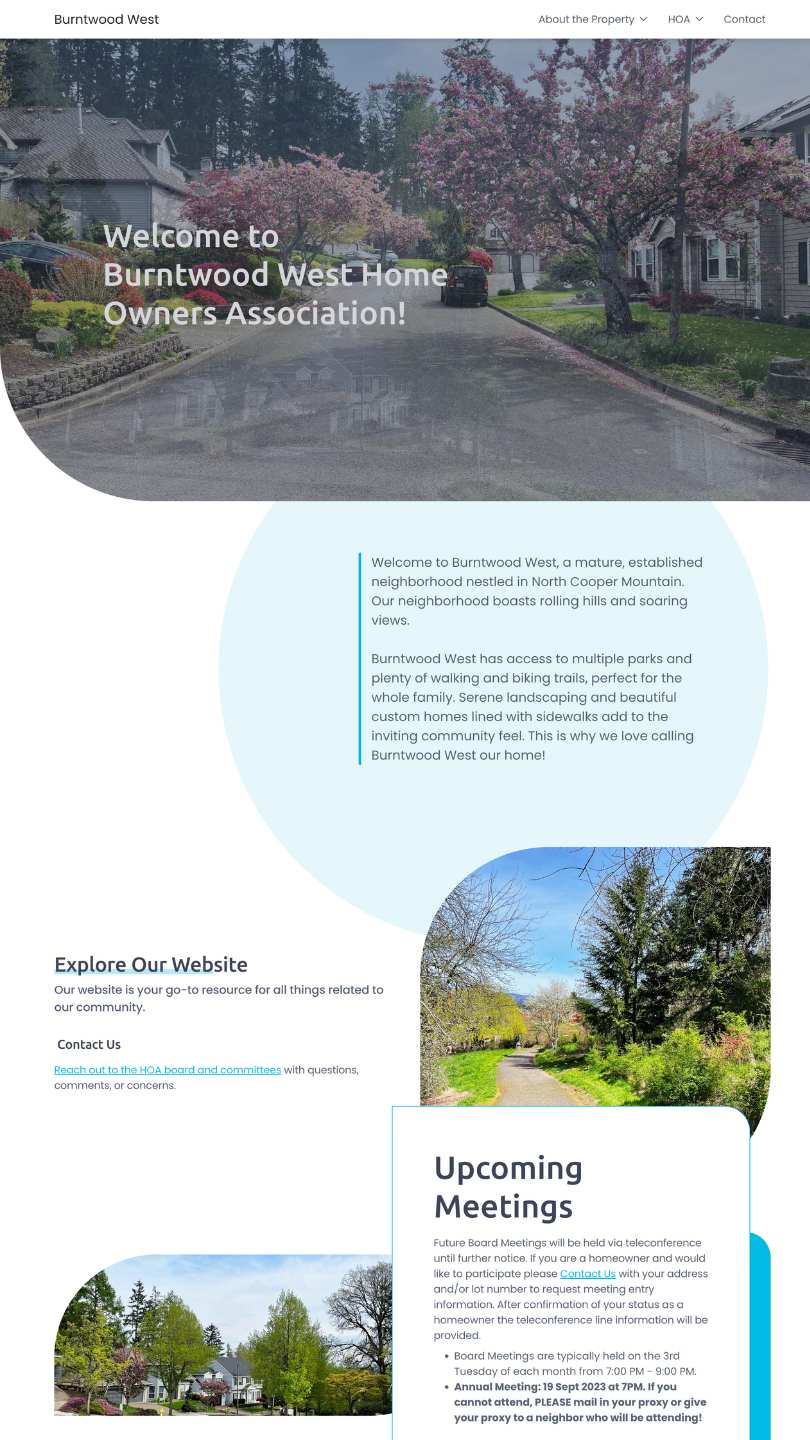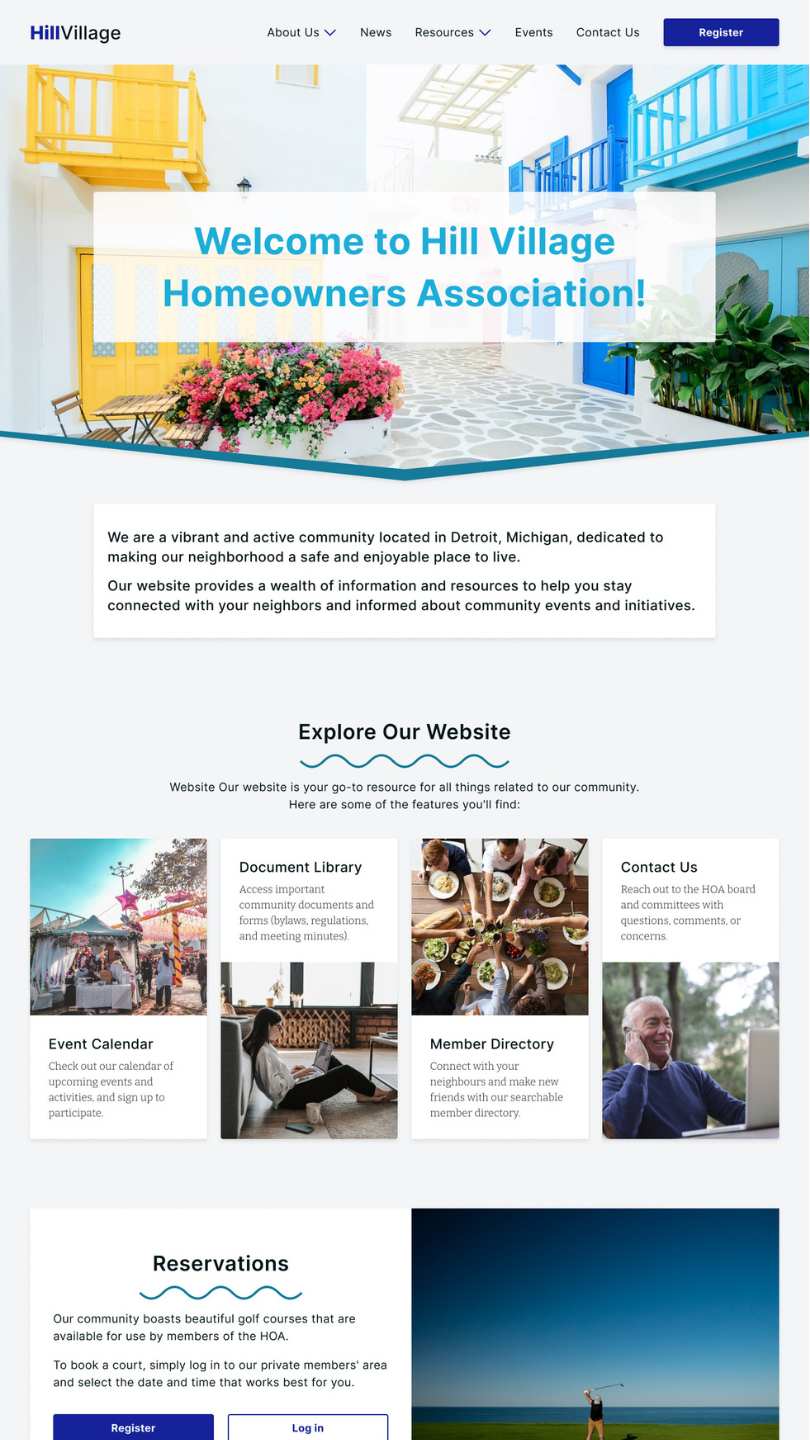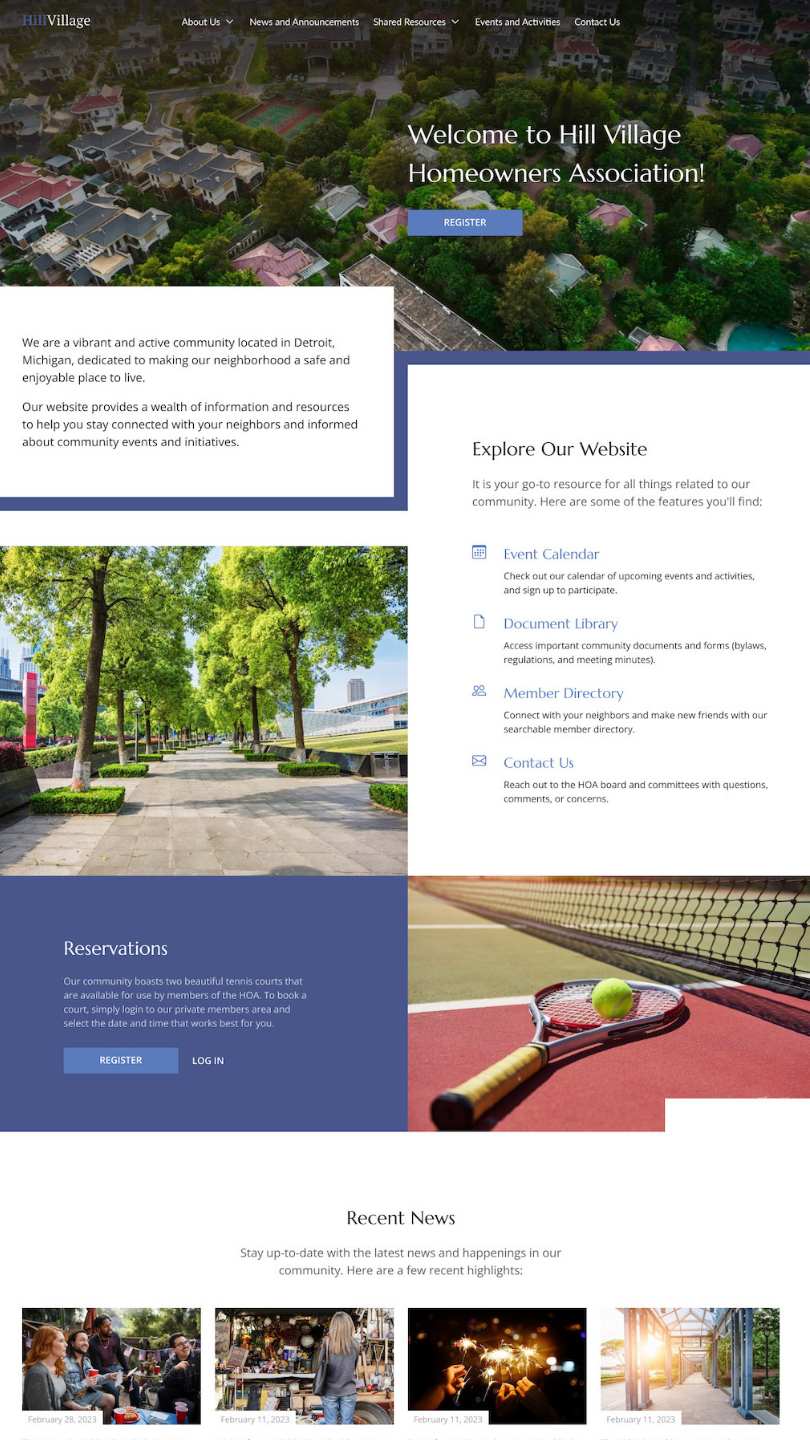The internet is home to over 1.1 billion websites as of 2024, making it more important than ever for organizations, including Homeowners Associations (HOAs), to establish a strong online presence. In an era where digital solutions streamline communication, enhance organization, and improve overall efficiency, having a well-designed HOA website and the right software can significantly benefit both board members and residents.
With the right digital tools, HOAs can simplify tasks such as collecting dues, sharing important documents, managing events, and ensuring compliance with legal requirements. This guide will walk you through everything you need to know about HOA websites and software, from their key benefits to selecting the best platform for your community’s needs.
Table of Contents
- Chapter 1: Understanding HOA Websites
- Chapter 2: Legal and Compliance Considerations
- Chapter 3: Choosing the Right HOA Website Platform
- Chapter 4: HOA Software for Community Management
- Chapter 5: Enhancing Engagement with HOA Digital Tools
- Chapter 6: Upgrading and Maintaining Your HOA Website
- Conclusion
Chapter 1: Understanding HOA Websites
What is an HOA Website?
An HOA (Homeowners Association) website is a digital platform designed to facilitate communication, transparency, and management within a residential community. It serves as a central hub where board members and residents can access important documents, pay dues, receive updates, and engage with their community.
Key Features Every HOA Website Should Have:
- Resident Portal: Secure login for residents to access personal information and community resources.
- Document Storage: Easy access to bylaws, meeting minutes, financial reports, and other official documents.
- Event Calendar: A shared calendar for meetings, social events, and maintenance schedules.
- Payment Processing: Online dues collection and financial tracking.
- News & Announcements: A bulletin board for community updates and alerts.
- Discussion Forums: A space for residents to communicate, ask questions, and provide feedback.
- Compliance Tools: Features to help the HOA adhere to state-specific legal requirements.
Benefits of an HOA Website
A well-designed HOA website offers numerous advantages that streamline community management and enhance resident engagement.
- Improved Communication with Residents
- Provides real-time updates, reducing the need for physical mailings.
- Ensures all residents have access to the same information.
- Easy Access to Documents and Resources
- Eliminates the hassle of searching for HOA policies, meeting minutes, or financial records.
- Allows for secure document storage with controlled access levels.
- Online Payment Processing
- Enables residents to pay dues, fines, or fees conveniently online.
- Reduces administrative work for HOA board members and improves collection rates.
- Event and Amenity Management
- Simplifies the process of booking amenities such as clubhouses, pools, or tennis courts.
- Provides an online RSVP system for community events.
- Increased Transparency and Community Trust
- Ensures all financial statements and HOA decisions are accessible to homeowners.
- Reduces misunderstandings and builds trust between the board and residents.
Key Components of a Successful HOA Website
A high-performing HOA website should include the following elements to ensure a seamless user experience and compliance with legal standards.
- User-Friendly Design and Navigation
- Simple and intuitive layout for all users, including those less tech-savvy.
- Well-organized menu with quick access to essential features.
- Mobile Responsiveness
- Optimized for smartphones and tablets to accommodate all users.
- Ensures easy navigation and functionality on any device.
- Secure Document Storage
- Password-protected sections for sensitive HOA documents.
- Encryption to protect homeowners' personal information.
- Integrated Communication Tools
- Email and SMS notifications for urgent announcements.
- Discussion forums or feedback forms for resident engagement.
- Online Payment and Billing System
- Secure payment gateway for collecting HOA dues and fees.
- Automated reminders to reduce late payments.
- Compliance with State Laws
- Ensures that the HOA website meets state requirements for transparency.
- Provides public access to legally required documents when necessary.
A well-maintained HOA website not only improves operational efficiency but also fosters a stronger sense of community by keeping residents informed and engaged.
Download a step-by-step checklist to plan your HOA website
A simple, step-by-step HOA Website Planning Template to help you build an efficient, engaging, and well-organized community website.
Chapter 2: Legal and Compliance Considerations
Ensuring that an HOA website complies with legal and regulatory requirements is crucial for transparency, security, and the protection of resident data. State laws often dictate what information must be available on an HOA or condo website, and following privacy and security best practices helps maintain trust within the community.
State-Specific HOA Website Requirements
Different states have specific laws regarding what HOAs must disclose on their websites. Below are some key regulations that associations must follow in Florida, Texas, and Nevada.
Florida Condo Website Law
Florida law requires condominium associations with 150 or more units to maintain an official website that provides access to essential documents. Some key requirements include:
- The website must be protected by a secure login system accessible only to unit owners.
- Documents such as declarations, bylaws, budgets, and financial reports must be posted online.
- The association must also provide meeting notices, agendas, and minutes digitally.
Failure to comply with Florida’s condo website law can lead to penalties and legal challenges.
Florida law requires condominium associations with 25 or more units to have a website. The law went into effect on July 1, 2024, and the deadline for compliance is January 1, 2026.
Texas POA Website Laws
In Texas, Property Owners Associations (POAs) with more than 60 lots are required to:
- Maintain a publicly accessible website where governing documents are posted.
- Provide annual budgets, board meeting notices, and policy documents online.
- Ensure updated contact information for the association and management company is available.
Non-compliance may lead to fines or lawsuits from homeowners.
Nevada HOA Website Regulations
Nevada has some of the strictest HOA transparency requirements. Associations must:
- Provide secure online access to records, financial statements, and meeting agendas.
- Offer a publicly accessible section for important HOA announcements and notices.
- Ensure that homeowner data is securely stored and only accessible by authorized members.
Nevada’s HOA laws aim to promote financial and operational transparency, reducing disputes between board members and homeowners.
Privacy and Security Best Practices
To protect homeowner data and ensure compliance, HOAs must implement robust privacy and security measures.
Ensuring Resident Data Protection
- Use encryption to protect sensitive information like payment details and personal records.
- Limit access to confidential documents by requiring role-based permissions.
- Regularly update privacy policies to align with evolving data protection laws.
Secure Login and Authentication
- Require strong passwords and enable two-factor authentication (2FA) for board members and residents.
- Implement automatic session timeouts to prevent unauthorized access.
- Use SSL certificates to encrypt website data and ensure secure connections.
Compliance with HOA Legal Standards
- Review and update the website regularly to ensure it meets state and federal regulations.
- Maintain audit logs to track who accesses sensitive documents.
- Work with a legal consultant to ensure compliance with HOA governance laws.
By following these legal and security best practices, HOAs can enhance transparency, minimize legal risks, and build trust with homeowners.
Chapter 3: Choosing the Right HOA Website Platform
Free vs. Paid HOA Website Platforms
When deciding on an HOA website platform, one of the first considerations is whether to use free HOA Software or paid solution. Each comes with its own advantages and drawbacks.
| Category | Pros | Cons |
|---|---|---|
| Free HOA Website Platforms |
|
|
| Paid HOA Website Platforms |
|
|
What to Consider Before Making a Choice
- Size of your HOA – Larger communities often need more advanced tools.
- Budget constraints – Weigh the long-term cost vs. benefits of a paid platform.
- Technical expertise – Some platforms require ongoing maintenance and updates.
- State compliance needs – Ensure the platform meets legal requirements in your area.
- Integration options – Check if the platform works with accounting and payment tools.
Best HOA Website Builders & Software
Many platforms cater specifically to HOAs, providing essential tools for community management. Here are some of the best HOA website builders and software options:
Top Recommended HOA Website Platforms
- Neighborhood.Online – A user-friendly website builder designed for HOAs with templates and communication features.
- Buildium – A property management tool that includes HOA website functionality.
- PayHOA – Focuses on HOA financial management with built-in payment processing and website tools.
- Wild Apricot – A membership management platform that can be adapted for HOAs.
- CINC Systems – A premium solution for managing HOAs with built-in accounting and compliance tracking.
How to Compare and Select the Best Option
- Ease of Use: Look for intuitive dashboards and simple setup.
- Customization: Ensure flexibility in design and features.
- Security Features: Check for SSL encryption and secure login capabilities.
- Support & Training: Opt for platforms with reliable customer service.
- Mobile-Friendly Design: Residents should be able to access the site from any device.
- Scalability: The platform should grow with your community’s needs.
Custom vs. Template Websites
HOAs must also decide whether to use a pre-built hoa website template or invest in a fully custom design.
When to Use a Website Builder vs. Hiring a Developer
- Use a Website Builder if:
- Your HOA has a small budget and needs a quick setup.
- The HOA requires basic functionality like document storage and announcements.
- You want ease of use and don’t need complex integrations.
- Hire a Developer if:
- Your HOA needs highly customized features like resident voting tools or custom payment portals.
- You need integration with existing HOA management software.
- Compliance laws require specific security measures and data protection protocols.
Customization Options for HOA Needs
- Custom Member Portals – Personalized logins for residents.
- Automated Notifications – Set up email and SMS alerts for meetings and dues.
- Payment Gateway Integration – Secure processing of HOA fees and fines.
- Legal Compliance Tools – Built-in solutions to meet state-specific HOA laws.
By choosing the right HOA website platform—whether free, paid, template-based, or custom-built—your community can improve efficiency, security, and overall engagement. The next chapter will dive into how HOA management software can further enhance operations.
Chapter 4: HOA Software for Community Management
Effective community management goes beyond just having a website—it requires the right software to streamline operations, enhance communication, and maintain financial transparency. HOA management software plays a critical role in helping associations handle administrative tasks efficiently while improving the resident experience.
What is HOA Management Software?
HOA management software is a digital tool designed to assist homeowner associations in managing their financials, communication, maintenance requests, and other operational tasks. Unlike an HOA website, which primarily serves as a communication platform, management software offers administrative functionalities that help streamline daily operations.
Differences Between Website Platforms and Management Software
Key Features of HOA Management Software
HOA software can automate several time-consuming tasks, reducing the workload on board members and management companies. Below are some of the most essential features of HOA management software:
1. Accounting and Financial Tracking
- Automated dues collection – Allows residents to pay HOA fees online.
- Expense tracking – Helps monitor and categorize association spending.
- Budgeting and forecasting – Assists in financial planning for maintenance and improvements.
- Late fee enforcement – Sends reminders and calculates penalties for overdue payments.
2. Resident Database and Communication Tools
- Member directory – Stores contact details, addresses, and ownership records.
- Automated email & SMS notifications – Keeps residents informed about meetings, policy changes, and dues.
- Community polls & surveys – Gathers homeowner feedback on community matters.
3. Maintenance Request Tracking
- Online work order submissions – Residents can submit maintenance requests digitally.
- Vendor management – Tracks service providers and work history.
- Status updates – Keeps residents informed about ongoing repairs or maintenance.
4. Event and Amenity Management
- Reservation system – Allows residents to book clubhouses, pools, or other common areas.
- Event planning tools – Helps schedule and manage community events.
- Guest access control – Provides temporary passes for visitors attending events.
Best HOA Software Options
There are numerous HOA management software solutions available, each offering unique features tailored to different community sizes and needs. Below is a comparison of some of the best HOA management software platforms:
| Software | Best For | Key Features | Pricing | Use Cases |
|---|---|---|---|---|
| Neighborhood.Online | Small to mid-sized HOAs | Website management, resident communication, Web Hosting | Free | Best for large associations needing **robust accounting & management features**. |
| AppFolio | HOAs with rental properties | Lease tracking, online payments, maintenance management | Custom pricing | Best for **rental-heavy communities** that need **lease tracking & financial management**. |
| CINC Systems | Large HOAs and management companies | Automated accounting, reporting tools, banking integration | Contact for pricing | Ideal for **large-scale HOAs** needing **integrated banking & automated financial tracking**. |
| PayHOA | Small to mid-sized HOAs | Online payments, automated invoicing, violation tracking | Monthly subscription | Best for **self-managed HOAs** looking for **affordable payment & invoicing solutions**. |
| Wild Apricot | Self-managed HOAs | Member database, event management, website hosting | Tiered pricing | Great for **self-managed HOAs** needing **event planning & member management**. |
| Vinteum Neigbrs | Improving resident engagement | Newsletters, resident directory, document storage | Free & paid plans | Ideal for **HOAs focused on community engagement & better communication**. |
Chapter 5: Enhancing Engagement with HOA Digital Tools
One of the key responsibilities of an HOA is ensuring strong communication and engagement among residents. Digital tools such as newsletters, online payments, and resident portals can significantly improve transparency, convenience, and overall community involvement. This chapter explores how HOAs can leverage technology to foster a more connected and well-managed community.
Improving Resident Communication
Clear and consistent communication is essential for keeping residents informed and engaged. HOA digital tools provide multiple ways to distribute information efficiently.
1. Newsletters and Automated Alerts
- HOA E-Newsletters: A well-designed email newsletter keeps homeowners updated on board decisions, upcoming meetings, and neighborhood events.
- Automated Notifications: Digital platforms allow HOAs to send real-time alerts via email, text, or mobile app notifications for important updates such as:
- Upcoming HOA dues deadlines
- Event reminders
- Emergency alerts (weather, maintenance issues, security updates)
- Personalized Messaging: Residents can receive targeted alerts based on their preferences, ensuring they stay informed about topics relevant to them.
2. Online Forums and Discussion Boards
- Private HOA Discussion Boards: These forums allow homeowners to ask questions, provide feedback, and discuss community issues in a secure online space.
- Social Media Integration: Many HOAs integrate private Facebook groups or use HOA software forums to improve engagement.
- Resident Feedback Surveys: HOAs can use digital forms or polls to gather homeowner input on community projects, policy changes, or upcoming events.
Leveraging Online Payments and Billing
Many HOA conflicts arise due to dues collection and financial transparency. Implementing online payment solutions makes the process more efficient and convenient for both the board and residents.
1. Benefits of Online Dues and Fees Collection
- Convenience: Homeowners can pay HOA dues, special assessments, and amenity fees anytime, anywhere.
- Automated Reminders: Residents receive email or text reminders about upcoming payments, reducing late payments.
- Faster Processing: Digital payments reduce manual tracking and administrative work for HOA treasurers.
2. Secure Payment Processing Options
- ACH Bank Transfers: Allows residents to set up automatic recurring payments, minimizing missed dues.
- Credit/Debit Card Payments: Gives homeowners flexible payment options.
- Third-Party Payment Portals: HOAs can integrate with platforms like PayHOA, Buildium, Zego, and CINC Systems to securely manage transactions.
- Encryption & Security: Ensuring that payments are processed through PCI-compliant systems protects resident financial data from fraud or breaches.
Utilizing HOA Portals for Member Access
A resident portal serves as the central hub for homeowners to access important HOA information, pay dues, and submit requests—all in one place.
1. Benefits of a Resident Portal
- 24/7 Access to Information: Homeowners can log in anytime to check announcements, financial statements, and board meeting minutes.
- Reduced Administrative Work: Automating common requests (such as document retrieval or amenity reservations) saves the board time.
- Transparency & Trust: Providing open access to HOA documents and decisions increases trust between the board and residents.
2. Features That Improve Engagement and Transparency
- Community Directory: A digital list of homeowners and board members for improved networking.
- Document Management: Easy access to bylaws, financial reports, meeting minutes, and policies.
- Violation Tracking: Homeowners can view and dispute violations online, making enforcement more transparent.
- Maintenance Requests: Residents can submit work orders for repairs or concerns and track progress digitally.
- Event & Amenity Reservations: Allows homeowners to book clubhouses, pools, and other shared spaces seamlessly.
By implementing HOA digital tools, associations can enhance engagement, improve financial operations, and build a stronger sense of community. In the next chapter, we will explore best practices for upgrading and maintaining your HOA website to ensure continued efficiency and effectiveness.
Chapter 6: Upgrading and Maintaining Your HOA Website
An HOA website is an essential tool for community engagement and management, but like any digital asset, it requires regular updates and maintenance to stay functional and relevant. A well-maintained website ensures easy access to important information, keeps residents informed, and enhances overall community transparency.
When to Upgrade Your HOA Website
Over time, an HOA website can become outdated, affecting its usability, security, and compliance. Here are some key indicators that it’s time for an upgrade.
Signs Your Website Needs a Refresh
- Outdated Design & Navigation: If the website looks dated or is difficult to navigate, residents may struggle to find information.
- Slow Loading Times: A slow website discourages users and impacts accessibility.
- Lack of Mobile Compatibility: If the website isn’t optimized for mobile devices, many homeowners may find it difficult to use.
- Broken Links & Missing Information: Important documents, forms, or announcements may be hard to find or no longer accessible.
- No Online Payment Options: A modern HOA website should allow residents to pay dues, fines, and fees digitally.
- Security Vulnerabilities: Websites without SSL encryption or outdated software may be vulnerable to cyber threats.
Common Pitfalls and Outdated Features
- Overloaded Homepages: Too much text or cluttered menus make it difficult to navigate.
- Poor Search Functionality: If users can’t easily find meeting minutes, financial statements, or contact information, engagement suffers.
- No Resident Login or Personalization: A lack of secure logins prevents customization for homeowners.
- Unsecured File Storage: If documents are stored without proper access controls, privacy concerns may arise.
Upgrading your HOA website ensures better usability, security, and efficiency, making it easier for board members and residents to stay connected.
Best Practices for Website Maintenance
A well-maintained website not only provides reliable access to information but also ensures compliance with legal requirements and enhanced security.
Regular Updates and Backups
- Software & Plugin Updates: Keeping website software and plugins updated prevents security risks.
- Content Refreshing: Regularly updating board meeting minutes, policies, and events keeps the site relevant.
- Scheduled Backups: Automate weekly or monthly backups to prevent data loss.
Ensuring Mobile-Friendliness and Security
- Responsive Design: Ensure the site adapts to all devices, including smartphones and tablets.
- SSL Encryption: Protect resident data with HTTPS security.
- Access Control Measures: Implement role-based logins for board members, residents, and vendors.
SEO and Visibility for HOA Websites
A great HOA website is only useful if residents can easily find it. Search Engine Optimization (SEO) helps improve visibility, ensuring homeowners can quickly access the information they need.
How to Ensure Your Website is Easily Found by Residents
- Use Local SEO Techniques:
- Include your community name and location in page titles and content.
- Register with Google My Business for better visibility in local searches.
- Optimize for Voice Search: Many homeowners search for HOA websites using voice assistants (e.g., "Where do I pay my HOA fees online?").
- Ensure Fast Load Times: Search engines prioritize websites that load quickly.
Best Practices for Search Engine Optimization
- Clear, Descriptive Page Titles: Ensure each page has a search-friendly title (e.g., “Sunset Hills HOA - Member Portal & Payments”).
- Meta Descriptions: Write brief, engaging summaries of each page to improve search rankings.
- Regularly Publish Content: Keeping a blog or news section updated helps maintain relevance.
- Internal Linking: Link to key pages (e.g., bylaws, payment portals, and announcements) to improve navigation.
Best HOA Website Examples for Inspiration
Here are a few real-world examples that effectively implement the content and design principles discussed:
Burntwood West Home Owners Association Website
- Website: https://www.burntwoodwest.com/
- Highlights: The website welcomes visitors with a vibrant homepage featuring images of the community's amenities. It includes a news section for updates and a clear navigation menu.
- Burntwood West stands out for its user-friendly document management system, making it effortless for residents to access important CC&Rs and other community documents with just a few clicks.

Hill Village Homeowners Association Example
- Community Information: This website provides comprehensive information on community rules, amenities, and upcoming events. It also offers downloadable forms and a detailed FAQ section.
- Soothing Visuals: The "Harbor Hues Blue" template greets visitors with tranquil and inviting shades of blue, creating a sense of calm and community. The imagery reflects the association's commitment to a serene living environment.

Maplewood Village HOA Example
- Resources and Education: Maplewood Village HOA's website features a blog with articles on landscaping tips, maintenance guides, and community news.
- Professional and Clean Design: This template showcases a professional and clean design with bold borders. It's the perfect choice for a straightforward and easy-to-navigate website.
- Clean and Organized Layout: The default design ensures that essential community information is presented in an organized and user-friendly manner.
- Aesthetic Simplicity: The use of bold borders adds a touch of sophistication while maintaining simplicity. It's an ideal template for associations that prioritize clarity and professionalism.

Conclusion
Maintaining an effective HOA website requires ongoing improvements, security updates, and strategic enhancements to keep homeowners engaged and informed.
Summary of Key Takeaways
- Regular updates ensure better usability, security, and compliance.
- Mobile-friendly design, SSL encryption, and backups protect both residents and board members.
- SEO best practices help residents find the website more easily.
- Online payment portals and resident logins increase convenience and transparency.
How to Get Started with Upgrading Your HOA Website and Software
- Conduct a Website Audit: Identify outdated elements, broken links, and missing features.
- Set a Budget & Timeline: Choose whether to revamp the current site or migrate to a new platform.
- Consult with Experts: Work with HOA website providers or developers for best results.
- Train Board Members & Residents: Ensure easy onboarding so all homeowners can use the new features.
Additional Resources and Support Options
- State HOA Regulations: Ensure your website meets state-mandated HOA requirements.
- HOA Website Providers: Research leading HOA website platforms and software solutions.
- Cybersecurity Guidelines: Protect resident data with best security practices.
By following these steps, your HOA website will remain a valuable tool for communication, transparency, and efficient community management. 🚀







